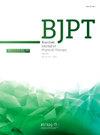物理治疗研究的优先事项:范围审查
IF 3.2
3区 医学
Q1 ORTHOPEDICS
引用次数: 0
摘要
背景物理治疗是一个不断发展的行业。为了提高研究效率,找出知识差距并确定研究重点至关重要。目的回顾物理治疗研究的重点,并将证据归纳为全球研究议程。方法我们通过在 PubMed、Web of Science 和 Google Scholar 上进行检索,收集研究报告和灰色文献,从而对研究重点进行了范围界定。如果研究涉及物理治疗师、物理治疗研究人员、患者或政策制定者,且他们确定了研究议程或开展了关于物理治疗研究优先级设置的研究,则该研究将被纳入其中。由两名独立审稿人进行内容分析,将研究重点收集为全球研究议程的主要议题。结果共纳入 25 项记录,其中大部分为原创文章(n = 19),来自高收入国家(n = 25)。九项研究确定了物理治疗研究的通用优先事项,其余研究则专门针对物理治疗的特定领域。自 2000 年以来,共确定了 551 项优先事项,涉及普通物理治疗和 7 个特定物理治疗领域。全球研究议程确定了未来研究的 9 个优先类别。本综述综合了有关物理治疗研究优先事项的文献,并提供了全球物理治疗研究议程。现在可以利用这 9 个优先类别来设计未来的物理治疗研究,并将研究工作引向与多个利益相关者和国家相关的问题。本文章由计算机程序翻译,如有差异,请以英文原文为准。
Priorities in physical therapy research: A scoping review
Background
Physical therapy is an ever-evolving profession. To improve research efficiency, it is crucial to identify knowledge gaps and establish research priorities.
Objective
To review priorities for physical therapy research, and to summarize the evidence into a global research agenda. As a secondary aim we sought to compare the priorities across studies.
Methods
We conducted a scoping review with searches in PubMed, Web of Science, and Google Scholar to gather studies and grey literature. Studies were included if they involved physical therapists, physical therapy researchers, patients, or policymakers who determined a research agenda or conducted a study on priority setting in physical therapy research. Content analysis was performed by two independent reviewers to gather research priorities into main topics for a global research agenda.
Results
Twenty-five records were included, most being original articles (n = 19), from high-income countries (n = 25). Nine studies established generic priorities for physical therapy research, while the remaining were dedicated to physical therapy specific fields. A total of 551 priorities were established since 2000 for general physical therapy and 7 specific physical therapy areas. A global research agenda was established with 9 priority categories for future research. Cost and effectiveness studies were the more frequently prioritized research priorities.
Conclusion
This review synthesized the literature on priorities for physical therapy research and provided a global physical therapy research agenda. These 9 priority categories can now be used to design future physical therapy studies and channel research efforts into questions that are relevant for multiple stakeholders and nationalities.
求助全文
通过发布文献求助,成功后即可免费获取论文全文。
去求助
来源期刊
CiteScore
6.10
自引率
8.80%
发文量
53
审稿时长
74 days
期刊介绍:
The Brazilian Journal of Physical Therapy (BJPT) is the official publication of the Brazilian Society of Physical Therapy Research and Graduate Studies (ABRAPG-Ft). It publishes original research articles on topics related to the areas of physical therapy and rehabilitation sciences, including clinical, basic or applied studies on the assessment, prevention, and treatment of movement disorders.

 求助内容:
求助内容: 应助结果提醒方式:
应助结果提醒方式:


